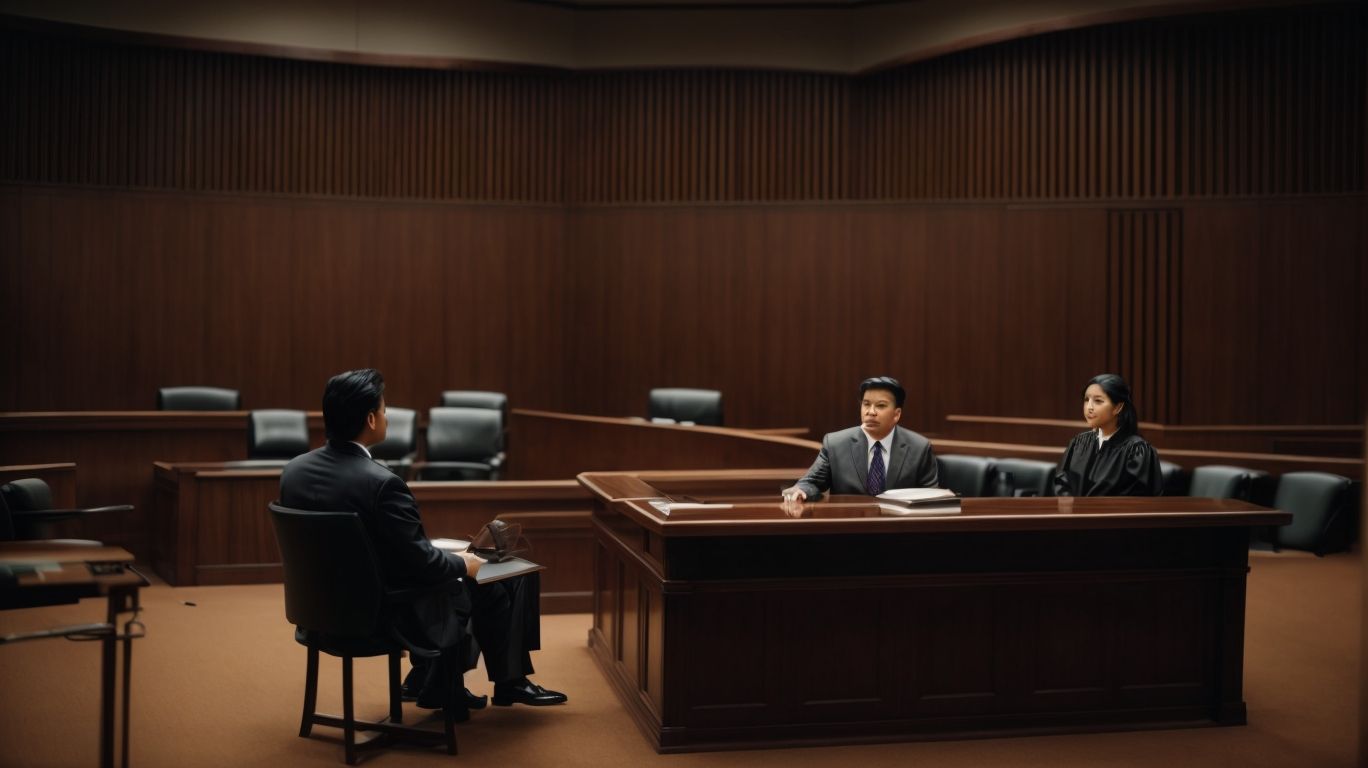Empathy bias is a critical factor in forensic psychology, with far-reaching implications for court cases. This article delves into the concept of empathy bias, its impact on forensic psychology, and the types of bias that can affect court proceedings.
We also explore the factors contributing to empathy bias, its consequences in the legal system, and strategies to mitigate its effects. Understanding and addressing empathy bias is crucial for ensuring fair and just outcomes in court cases.
Contents
- 1 Key Takeaways:
- 2 What Is Empathy Bias?
- 3 How Does Empathy Bias Affect Forensic Psychology?
- 4 What Factors Contribute to Empathy Bias in Court Cases?
- 5 What Are the Consequences of Empathy Bias in Forensic Psychology?
- 6 How Can Empathy Bias Be Mitigated in Court Cases?
- 7 Frequently Asked Questions
- 7.1 What is empathy bias in forensic psychology and how does it impact court cases?
- 7.2 How does empathy bias affect the objectivity of forensic psychologists in court cases?
- 7.3 Can empathy bias lead to wrongful convictions in court cases?
- 7.4 How can forensic psychologists recognize and prevent empathy bias in their evaluations?
- 7.5 Are there any specific types of cases where empathy bias is more likely to occur in forensic psychology?
- 7.6 What can be done to address empathy bias in the legal system and improve the accuracy of court cases?
Key Takeaways:
What Is Empathy Bias?
Empathy bias refers to the phenomenon where individuals’ emotions and feelings influence their judgment and decision-making processes, particularly in forensic psychology and mental health contexts.
This bias can manifest in various forms, such as attributing an individual’s behavior solely to their emotional state, without considering other potential influencing factors.
In forensic psychology, empathy bias can significantly impact the evaluation of a defendant’s mental state, potentially leading to unfair assessments due to overly sympathetic or punitive interpretations of behavior.
Understanding the intricacies of empathy bias is crucial for maintaining ethical and unbiased mental health assessments, as it can greatly impact the interpretation of psychological evaluations and influence the overall decisions made in legal and clinical settings.
How Does Empathy Bias Affect Forensic Psychology?
Empathy bias exerts a significant influence on forensic psychology, forensic psychiatry, and the overall landscape of forensic mental health assessments within legal proceedings.
What Are the Types of Empathy Bias in Forensic Psychology?
In the realm of forensic psychology, several types of empathy bias manifest, influencing forensic evaluations, mental health assessments, and the emotional context surrounding forensic examinations.
Empathy bias in forensic psychology can impact the objectivity of forensic evaluations, shaping the outcomes of cases. It is often intertwined with emotional considerations in mental health assessments, possibly leading to subjective conclusions.
Distinct types of bias such as confirmatory bias and anchoring bias may emerge, further complicating the accuracy of the assessments. The understanding of these manifestations is crucial for fostering more impartial and thorough forensic procedures, promoting fairness and justice within the legal and mental health systems.
What Factors Contribute to Empathy Bias in Court Cases?
Several factors contribute to the prevalence of empathy bias in court cases, particularly within the domain of forensic psychology, encompassing cognitive biases, ethical challenges, and their impact on legal decision-making processes.
Personal Experiences
Personal experiences play a pivotal role in fostering empathy bias within the realm of forensic psychology and mental health assessments, challenging the application of ethical principles and professional objectivity.
This phenomenon is especially relevant in forensic psychology, where the ability to maintain objectivity and adhere to ethical standards is of utmost importance.
The impact of personal experiences on empathy bias raises concerns regarding the reliability and validity of mental health assessments, which form the basis for critical decisions in the legal system.
Acknowledging the influence of personal experiences on empathy bias underscores the need for ongoing professional development and supervision to mitigate its potential adverse effects on the accuracy and fairness of forensic evaluations.
Preconceived Notions and Stereotypes
Preconceived notions and stereotypes serve as significant contributors to empathy bias within the realms of forensic psychology and forensic mental health assessments, impacting the objectivity and fairness of evaluations.
This bias can manifest when professionals make assumptions based on societal stereotypes, potentially leading to inaccurate assessments that may disproportionally affect certain demographic groups.
Implicit biases can influence the interpretation of behaviors and interactions, leading to skewed conclusions and potentially undermining the effectiveness of mental health evaluations in legal contexts.
The detrimental impact of empathy bias on fairness highlights the critical need for ongoing awareness and training to mitigate its effects in forensic psychology.
Emotional Attachment to the Case
Emotional attachment to a case can significantly exacerbate empathy bias in forensic psychology and forensic evaluations, particularly in assessing an individual’s mental state and psychological well-being.
This phenomenon can arise when a forensic evaluator becomes emotionally invested in a particular case, thereby impacting their objectivity and influencing the interpretation of evidence.
The attachment may lead to a heightened focus on specific details or circumstances, potentially overshadowing the need for comprehensive and unbiased assessments.
As a result, the challenges posed to objective decision-making in forensic psychology are magnified, raising concerns about the accuracy and fairness of mental state assessments and the overall reliability of forensic evaluations.
What Are the Consequences of Empathy Bias in Forensic Psychology?
The consequences of empathy bias in forensic psychology and mental health assessments extend to legal proceedings, ethical dilemmas, and the potential impact on the fair administration of justice.
Wrongful Convictions
Empathy bias within forensic psychology can lead to wrongful convictions, undermining the accuracy of forensic evaluations and legal decision-making processes, with significant repercussions for the administration of justice.
This bias often occurs when professionals involved in the judicial system, such as judges, jurors, and forensic evaluators, allow their feelings and emotions to influence their evaluations and decisions. When empathy for a victim or a perpetrator excessively skews their perspective, it can lead to inaccurate conclusions and flawed reasoning, ultimately resulting in wrongful convictions.
The potential ramifications of this phenomenon for the judicial system are far-reaching, encompassing issues related to the fairness and equity of legal proceedings, public trust in the justice system, and the lives impacted by these miscarriages of justice.
Inaccurate Assessments and Recommendations
Empathy bias may result in inaccurate assessments and recommendations within the domain of forensic mental health, affecting the validity and reliability of forensic psychological evaluations.
This bias can influence the interpretation of behavior and demeanor in individuals under evaluation, potentially skewing the results of assessments. It poses a significant challenge to the objectivity of forensic mental health professionals, as it may lead to the misjudgment of the mental state of individuals involved in legal proceedings.
Moreover, empathy bias can impact the formulation of recommendations, possibly leading to misguided interventions or inappropriate sentencing decisions. The consequences of such inaccuracies can have far-reaching implications in the criminal justice system, affecting not only the individual under evaluation but also public safety and the fairness of legal proceedings.
Unfair Treatment of Defendants and Victims
Empathy bias can lead to the unfair treatment of defendants and victims within the justice system, posing ethical challenges and compromising the equitable administration of justice.
This bias, rooted in a subjective understanding of emotions and experiences, has significant ramifications on legal proceedings. For instance, it may influence jury decisions, leading to disproportionate sentencing.
Empathetic attitudes towards victims could impact the objectivity of legal professionals, influencing their judgment and the interpretation of evidence. This can result in disparities in sentencing and potentially hinder the fair treatment of individuals.
How Can Empathy Bias Be Mitigated in Court Cases?
Mitigating empathy bias in court cases requires a concerted effort to uphold ethical principles, refine forensic practice, and foster a more objective approach to forensic psychology and mental health assessments.
Awareness and Education
Raising awareness and providing education about empathy bias is crucial within the realms of forensic psychology and mental health, enableing professionals to recognize and mitigate its influence in their practice.
Empathy bias plays a pivotal role in shaping the perceptions and judgments of professionals in forensic psychology and mental health assessments. By understanding the impact of empathy bias, individuals within these fields can develop a more nuanced approach to their evaluations and interactions.
Education equips professionals with the necessary knowledge and skills to identify and address instances of empathy bias in their work. It fosters a culture of reflection and self-awareness, encouraging practitioners to continually evaluate their own biases and assumptions.
Incorporating relevant training on empathy bias into academic curricula and professional development programs ensures that future generations of psychologists and mental health practitioners enter the field with a critical awareness of this phenomenon. This proactive approach contributes to the long-term mitigation of empathy bias within the practice of forensic psychology and mental health assessments.
Diversity and Inclusion Training
Implementing diversity and inclusion training initiatives is essential for combating empathy bias within forensic psychology and enhancing the fairness and equity of the justice system.
This type of training equips professionals within the forensic psychology field with the understanding and skills necessary to recognize and address their own biases. This promotes more objective evaluations and assessments.
In the justice system, diversity and inclusion training helps to mitigate the impact of biases on legal proceedings. This ensures that all individuals receive fair treatment and representation.
At a broader level, these initiatives contribute to creating a more inclusive and equitable society by fostering a culture of respect and understanding across diverse communities.
Use of Objective Measures and Tools
Leveraging objective measures and tools is crucial for mitigating empathy bias in forensic psychological assessments, enhancing the reliability and validity of forensic science in legal proceedings.
Incorporating objective measures and tools is essential for practitioners to objectively evaluate and measure empathic responses. This is especially crucial in forensic psychological assessments, where bias can impact the accuracy of the analysis. Objective measures also help streamline the assessment process, providing a consistent and reliable framework for assessing empathy in legal contexts. These measures are vital in ensuring that the evidence presented in legal proceedings is based on impartial and sound analysis, ultimately enhancing the validity and credibility of forensic science in the judicial system.
Frequently Asked Questions
What is empathy bias in forensic psychology and how does it impact court cases?
Empathy bias is the tendency for individuals to be influenced by their own emotional reactions and personal biases when making decisions. In forensic psychology, this can lead to biased evaluations and judgments of defendants, witnesses, and evidence, which can ultimately impact the outcome of a court case.
How does empathy bias affect the objectivity of forensic psychologists in court cases?
Empathy bias can compromise the objectivity of forensic psychologists by causing them to rely on their own emotions and personal beliefs rather than relying on impartial evidence and professional evaluations. This can result in biased opinions and recommendations that can significantly impact the outcome of a court case.
Can empathy bias lead to wrongful convictions in court cases?
Yes, empathy bias can have a significant impact on court cases and can lead to wrongful convictions. When forensic psychologists are influenced by their own biases, it can lead to inaccurate evaluations and judgments, which can result in the wrong person being convicted for a crime.
How can forensic psychologists recognize and prevent empathy bias in their evaluations?
Forensic psychologists can recognize and prevent empathy bias in their evaluations by being aware of their own biases and actively seeking out objective evidence and evaluations. They can also consult with colleagues and engage in ongoing training to prevent the influence of empathy bias in their work.
Are there any specific types of cases where empathy bias is more likely to occur in forensic psychology?
Empathy bias can occur in any type of case, but it is particularly prevalent in cases involving vulnerable populations, such as children or victims of abuse. In these cases, it is important for forensic psychologists to be aware of their own biases and strive for objectivity in their evaluations.
What can be done to address empathy bias in the legal system and improve the accuracy of court cases?
To address empathy bias in the legal system, it is important for forensic psychologists to receive ongoing training on recognizing and preventing bias in their evaluations. It is also crucial for judges and attorneys to be aware of the potential impact of empathy bias and to seek out multiple expert opinions to ensure a fair and accurate outcome in court cases.




